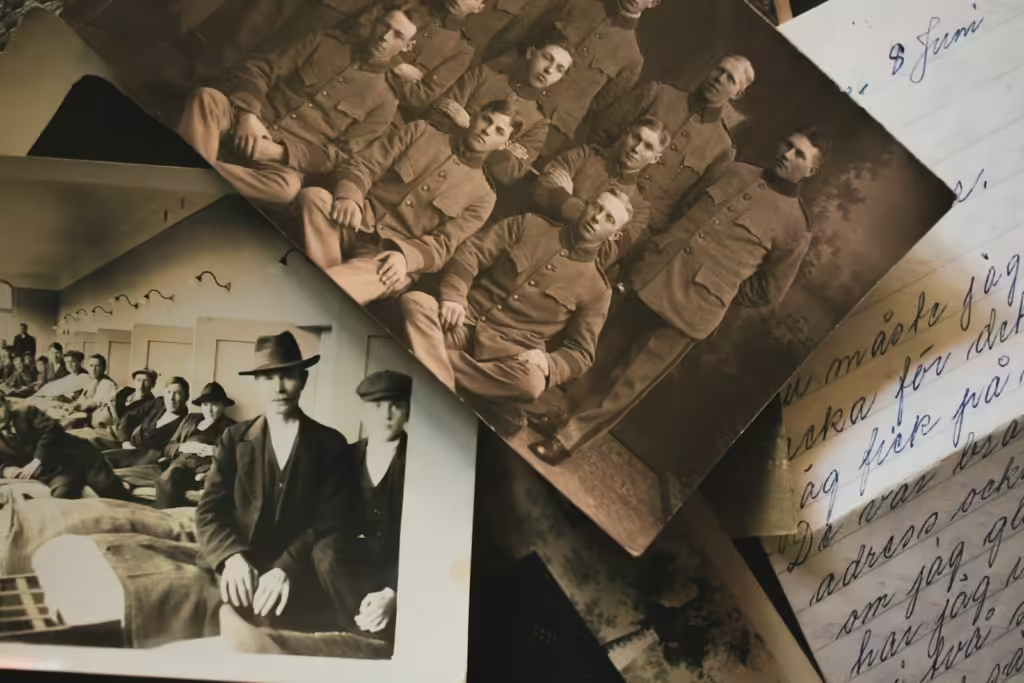
Every genealogist, new or experienced, will face a “brick wall” in their research. Overcoming genealogical challenges or “brick walls” is difficult. Progress seems impossible, often due to missing records or unclear connections. These obstacles can be frustrating. But they offer chances for deeper learning and discovery. This article offers tips and support to lead you on the path to overcoming genealogy challenges.
Key Takeaways About Overcoming Genealogical Challenges
- Genealogical brick walls are common but can be overcome with persistence and strategy.
- Re-examining existing information with fresh eyes can reveal overlooked details.
- Searching for siblings, cousins, and other relatives can provide new clues.
- Leveraging technology such as DNA testing and online databases can break down barriers.
- Collaborating with the genealogy community and seeking professional help can offer new insights.
Understanding Genealogical Brick Walls
Defining Brick Walls in Genealogy
In genealogy, a “brick wall” is when you hit a point where you can’t find more information about an ancestor. This can be super frustrating, but it’s also a chance to learn more and dig deeper. Tackle it like a mystery awaiting your clever mind. Sometimes, these walls are due to missing records or common names that make it hard to track people down.
Common Causes of Brick Walls
Brick walls can happen for many reasons:
- Missing records due to wars or natural disasters.
- Errors in documents.
- Common surnames that make it hard to find the right person.
- Ancestors suddenly appear in one place without any clues about where they came from.
The Importance of Persistence
Don’t give up! Persistence is key in overcoming genealogical challenges. Even if you hit a brick wall, keep looking. Try new methods or ask for help. Remember, brick walls probably aren’t as bad as you think! They can often be overcome with a fresh perspective or different resources.
When you hit a brick wall, it’s like a challenge to find a new way around. Keep pushing, and you’ll eventually find a way through.
Re-examining Existing Information

Hitting a genealogy roadblock? Pause, reflect, and revisit your findings. A fresh look at existing data can reveal hidden clues. It can also show new research paths. This can reveal new clues or correct mistakes you might have missed the first time around. Mastering this skill requires finesse and practice. Approach it strategically, hone your technique, and watch your proficiency soar.
Expanding Your Search Beyond Direct Lines
When you’re stuck on a direct ancestor, sometimes the best way forward is to look sideways. Collateral lines can hide gems. Their power shatters obstacles, clearing your path to success. Let’s dive into some strategies to expand your search beyond direct lines.
Exploring Siblings and Cousins
Don’t just focus on your direct ancestors. Researching siblings and cousins can provide valuable clues. For example, a sibling’s marriage record might list the parents’ names. A cousin’s obituary could mention a place of origin. By piecing together this info, you can better understand your family history. This is called the FAN Club (friends/family, associates, and neighbors).
Utilizing Obituaries and Wills
Obituaries and wills are treasure troves of information. They often list surviving family members. This can help you find unknown relatives. Wills can also reveal property transfers and family relationships. Make sure to check local newspapers and probate records for these documents.
Investigating Property Records
Property records can be a goldmine for genealogists. They can show you where your ancestors lived, who their neighbors were, and how they acquired their land. These records can help you track migration patterns and find family connections. Don’t overlook deeds, mortgages, and land grants in your research.
Sometimes, the key to overcoming genealogy challenges is in the details of collateral relatives. Expanding your search opens new avenues for discovery. It increases your chances of success.
Leveraging Technology and Tools for Overcoming Genealogical Challenges

Using DNA Testing
DNA testing has revolutionized genealogy. Connecting with distant relatives can reveal unknown branches of your family tree. When documents fail, genetic analysis shines. DNA tests unlock ancestral secrets, revealing hidden connections where paper trails go cold. It’s like having a secret weapon in your genealogy toolkit!
Exploring Online Databases
Online databases like Ancestry.com, MyHeritage, and FamilySearch offer vast collections of records. They provide access to birth, marriage, and death certificates, and census data. Don’t forget to explore different archives and libraries online. Sometimes, a simple search can reveal a treasure trove of information.
Employing Genealogy Software
Genealogy software, such as Family Tree Maker, MacFamilyTree, and RootsMagic, helps you organize your research and create family trees. These tools can analyze your findings and even suggest new research paths. It’s like having a personal assistant for your genealogy journey.
Embracing new technologies can uncover hidden clues and advance your genealogical exploration. Every brick wall is a chance to learn about your ancestors.
Collaborating with the Genealogy Community
Joining Genealogy Forums
One of the best ways to overcome genealogical challenges is to join genealogy forums. These online communities are full of people who share your passion for family history. You can ask questions, share your findings, and get advice from others who might have faced similar challenges. FamilySearch genealogy research groups are great places to start. They allow you to post specific questions or even translation requests related to your research.
Attending Workshops and Conferences Will Help You With Overcoming Genealogy Challenges
Workshops and conferences are great. You can learn from experts and meet other genealogy fans. These events often feature lectures, hands-on sessions, and networking opportunities. You can gain new skills, discover new resources, and even find a mentor. Plus, it’s a lot of fun to be surrounded by people who are as excited about genealogy as you are!
Seeking Help from Professional Genealogists
Sometimes, you might hit a wall that you can’t get past on your own. When genealogical roadblocks arise, a seasoned expert may hold the key to unlocking your family’s hidden past. These experts have the skills and tools to solve tough research problems. When choosing a genealogist, find one who specializes in your research area. This can make a big difference in the quality of the help you receive.
Working with others can lead to new research and fresh ideas. They might offer insights you haven’t considered. Don’t be afraid to reach out and ask for help—genealogy is a community effort!
Exploring Regional and Historical Contexts
Understanding Migration Patterns
When tracing your family tree, know the migration patterns of the time. Rivers, mountains, and trails often guided where people moved. If you know where your family settled, you can often guess where they came from. Early settlers sometimes named new towns after their old homes. This hints at their origins.
Researching Local Histories
Local histories can be a goldmine of information. They provide context about the community your ancestors lived in. Research guides created by subject specialists can offer background and resources for further study. These guides can help you understand the conditions that shaped your ancestors’ lives.
Utilizing Regional Archives
Don’t overlook regional archives. They often hold unique records not found elsewhere. These archives can include land deeds, court records, and even personal letters. Exploring these resources can fill in gaps and provide a richer picture of your family’s past.
Considering Surname Variations

When diving into genealogy, surname variations can be tricky. It’s amazing how many different ways a name can be spelled or recorded over the years. Let’s break down some key strategies to tackle this challenge.
Overcoming Language Barriers in Records
Genealogy research can be tricky, especially when you hit a language barrier. Fear not! These pointers will guide you smoothly through.
Utilizing Translation Tools
Advanced translation tools falter with genealogical records. Dictionaries and apps, while useful for everyday text, often misinterpret the nuanced language of family histories. Specialized knowledge is crucial for deciphering these unique documents accurately. Yet, they can still be useful for getting the gist of a document. Cross-reference translations across various platforms for precision. Verify meanings through diverse channels to guarantee linguistic fidelity.
Seeking Bilingual Records
Look for records available in both the original language and a translation. These can often be found in regional archives or specialized genealogy databases. Time and effort vanish with this potent shortcut.
Learning Key Genealogical Terms
Sometimes, learning a few key terms in the language of your ancestors can make a big difference. Records often repeat words like “birth,” “marriage,” and “death.” So, knowing these can help you quickly find important documents.
Language barriers crumble when tracing family roots. Uncover ancestral tales across tongues, dialects, and cultures. Embrace the challenge – your heritage awaits. With some effort and the right tools, you can break this wall. You will find amazing stories about your ancestors.
Dealing with Missing or Destroyed Records
Genealogy can be a tough puzzle, especially when records are missing or destroyed. But don’t worry. You can overcome these genealogical challenges and uncover your family’s history.
Hiring Professional Help

When you hit a brick wall in your genealogical research, hiring a professional genealogist is a great option. This could be the best and most efficient path to overcoming genealogical challenges.
Staying Motivated and Avoiding Burnout
Genealogy can be a long and sometimes frustrating journey. It’s easy to feel overwhelmed or stuck, but staying motivated is key to making progress. Here are some tips to help you keep going and avoid burnout.
Setting Realistic Goals For Overcoming Genealogy Challenges
One of the best ways to stay motivated is to set realistic goals. Divide research into bite-sized chunks. Tackle one small task at a time. This approach makes daunting projects feel doable and progress steady. Instead of tracing your whole family tree at once, focus on one ancestor at a time. Toast your progress. Each milestone merits a moment’s joy as you journey onward.
Taking Breaks and Recharging
It’s important to take breaks and recharge. If you find yourself hitting a brick wall, step away for a bit. A new outlook often sparks transformative change. Stroll outdoors, dive into a novel, or indulge in a cherished pastime. When you come back, you’ll be ready to tackle your research with renewed energy.
Celebrating Small Wins When Overcoming Genealogy Challenges
Each fresh insight propels us onward, advancing our knowledge and understanding bit by bit. Celebrate these small wins! Whether it’s finding a birth certificate or a new relative, take a moment to appreciate your progress. These small victories can provide the motivation you need to keep going.
Remember, genealogy is a marathon, not a sprint. Savor life’s path. Rush not. Delight in each step. Each discovery brings you closer to uncovering your family’s story.
Set realistic goals. Take breaks. Celebrate small wins. These steps will keep you motivated and avoid burnout. Keep pushing forward. Every step brings you closer to your family’s history.
Conclusion
Cracking ancestral puzzles demands grit. Genealogists face daunting hurdles in their quest to uncover family histories. Persistence often yields breakthroughs, revealing long-hidden secrets and forgotten stories. With patience and skill, even the most stubborn obstacles can crumble, unveiling rich tapestries of heritage. But, it’s not impossible. Use the strategies we’ve discussed. They include re-examining existing info, expanding your search beyond direct lines, and considering surname variations. These steps can uncover new clues and help you make progress. Remember, every obstacle is an opportunity to learn more about your family’s history. So, stay curious, keep digging, and don’t give up. Uncover the hidden tales of your family’s past. Long-forgotten ancestors beckon, eager to share their secrets and adventures. Your lineage holds a trove of untold narratives, ready to be unearthed and cherished. Delve into your roots and bring these dormant stories to life.
‘t give up. Your ancestors’ stories are waiting to be discovered!
Frequently Asked Questions About Overcoming Genealogy Challenges
What is a genealogical brick wall?
A genealogical brick wall is a dead end in family research. Ancestral trails run cold. Research dead-ends frustrate. Yet hidden clues await discovery. Persistence and creativity may reveal new paths forward. The family history quest continues, mysteries still unsolved. This can happen because of missing records, common names, or unclear connections.
Why do genealogical brick walls happen?
Brick walls can happen for many reasons. These include lost or destroyed records, ancestors with common names, or changes in names over time.
How can I review my data with fresh eyes?
Take a break and come back later, or ask someone else to look at your data. Sometimes a new perspective can help you see things you missed before.
Why should I explore siblings and cousins in my research?
Siblings and cousins might have records that mention your direct ancestor. Genealogical roadblocks crumble when you uncover hidden clues in overlooked records. Dig deeper, and those elusive ancestors may finally reveal themselves.
How can DNA testing help in genealogy?
DNA testing can help you find relatives you didn’t know about. It can also confirm or disprove connections in your family tree.
What are some useful online databases for genealogy?
Websites like Ancestry.com, FamilySearch.org, and MyHeritage.com have large collections of records that can help you in your research.
When should I consider hiring a professional genealogist?
If you’ve tried everything and made no progress, a professional genealogist might help. They have experience and resources that can be very useful.
How can I stay motivated in my genealogical research?
Set achievable goals, celebrate small wins. Join genealogy groups for support and inspiration. Explore new research methods to reignite curiosity. Take breaks to prevent burnout. Remember why you started – connecting with your roots. Rotate between family lines to maintain interest. Share discoveries with relatives to boost enthusiasm.
Dream small, act big. Savor tiny triumphs along your journey. Each modest milestone reached deserves a moment of joy.


